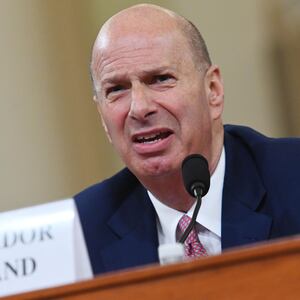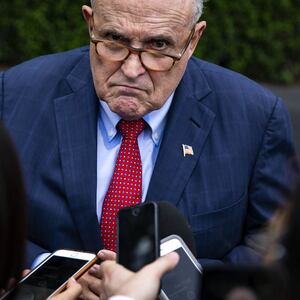Before his testimony even concluded Wednesday, U.S. Ambassador to the EU Gordon Sondland was in a rush to leave Washington.
“Ambassador Sondland had intended to fly back to Brussels to resume his duties at the end of the day, so it would be a great convenience to ... try and wrap up in time that he might be able to make his flight,” asked his lawyer, during a break in the proceedings three hours into the hearing.
The request was ignored.
Sondland’s testimony in front of House impeachment investigators began to ruffle feathers within the first hour of his public hearing. It took just ten minutes for him to tie President Donald Trump, Secretary of State Mike Pompeo, the president’s personal lawyer, Rudy Giuliani and three different government agencies to his efforts to convince Ukraine to open specific investigations in exchange for a White House visit for President Volodymyr Zelensky.
The ambassador to the EU was arguably one of the most important witnesses in the House impeachment probe because of his direct communications with Trump, including a now infamous July 26 phone call from a restaurant in Kyiv where the president asked if Zelensky would commit to launching “the investigations.” Sondland replied “he’ll do it,” according to David Holmes, a State Department staffer in Kyiv, who is slated to testify Thursday. His testimony Wednesday pushed top administration officials, including Trump, into the spotlight when he said that his bosses were aware of his work with Giuliani on Ukraine
It wasn’t long before members of the administration wanted to get as far away from him as possible.
President Trump—who Sondland said he spoke with more than twenty times—held an impromptu press conference with reporters to try and distance himself from the ambassador, saying he didn’t know Sondland “that well.” Energy Secretary Rick Perry, too, sent out a public statement during Sondland’s testimony saying the ambassador had “misrepresented” his interaction with Rudy Giuliani and the direction he received from Trump. Pence’s office flatly rejected the vice president’s role in a statement. Pompeo, who was flying back from a trip to Asia, also denied Sondland’s account.
Rudy Giuliani, the president’s personal lawyer and a particular target of Sondland’s testimony, tweeted that he barely knew the guy, too. “I came into this at Volker’s request. Sondland is speculating based on VERY little contact. I never met him and had very few calls with him, mostly with Volker.”
The State Department fired back at Sondland later in the day following the end of the public hearing.
“Gordon Sondland never told Secretary Pompeo that he believed the President was linking aid to investigations of political opponents,” spokeswoman Morgan Ortagus said on Twitter. “Any suggestion to the contrary is flat out false.”
Sondland was a man on an island, but he didn’t seem to mind. As some of the Republicans’ toughest inquirers asked—and at times yelled—questions, he smiled slightly as he answered, at times laughing and joking, seemingly aware that at this point there was very little either side of the partisan divide could do to him and that his fate rested with Pompeo and Trump.
His opening statement left few unscathed. Sondland said it was Giuliani who coordinated the campaign in Ukraine to convince officials to investigate Burisma and the 2016 elections, adding that he only joined the cause when President Trump told him to. He also said multiple senior officials at the State Department, including Pompeo, were aware of his work with Giuliani and had been read in on specific conversations regarding the investigations.
“We did not want to work with Mr. Giuliani. Simply put, we played the hand we were dealt. We all understood that if we refused to work with Mr. Giuliani, we would lose an important opportunity to cement relations between the United States and Ukraine,” Sondland said. “So we followed the President’s orders.”
Democrats watched Sondland’s testimony unspool on Wednesday and believed they were finally getting the made-for-TV moment they craved to drive home the core of their impeachment case. “These facts have never been in question,” said a Democratic aide. “But having the TV moment inscribes the scandal indelibly in history.”
During an early break in the hearing, Rep. Denny Heck (D-WA), a member of the intelligence panel, told The Daily Beast: “I don’t think he helped the president.”
“I thought he had three choices: he could perjure himself, he could have a profound case of amnesia, or he would attempt to come clean,” said Heck. “There was some interesting amnesia going on there, but I also think that he was pretty forthcoming. He has to know that retribution is around the corner.”
On the other side, Republicans seemed to struggle to come up with a clear-cut strategy on how to handle the star witness.
At one point Republican counsel Steve Castor attempted to undercut Sondland’s testimony by saying he didn’t have first-hand notes outlining his conversations with Trump officials on Ukraine.
“You don't have records. You don't have your notes because you didn’t take notes. You don't have a lot of recollections,” said Castor. “This is like the trifecta of unreliability. Isn't that true?”
“I think I filled in a lot of blanks,” Sondland replied.
In another series of questions, Castor remarked that Sondland “only had a couple conversations with the president” himself —even as earlier witnesses had been pilloried for not having access to Trump.
Castor also tried to underscore Sondland’s statement that he did not know in real time that the investigation into Burisma he was pushing the Ukrainians to take on was actually code for an investigation into the Bidens.
Sondland repeatedly told House investigators it wasn’t until much later, after the release of the call transcript between Trump and Zelensky, that he understood there to be a connection between the two. Republicans attempted to flesh that point Tuesday, too, when former top diplomat for Ukraine Kurt Volker appeared for his public hearing. He also said he did not make the connection between Burisma and the Bidens.
But by the second hour Sondland had thrown a wrench in that specific Republican strategy, saying that like Volker, he in retrospect would have raised his own objections if he had made the connection between Burisma and Biden. That assertion was prompted by a question from Chairman of the House Intelligence Committee Adam Schiff.
Schiff said Volker had testified that he wished he had understood the connection between Burisma and the Bidens earlier and that had he done so, he would have raised his own objections.
“Does that sum up your views as well?” Schiff asked.
“It does,” Sondland said.
The testimony from Sondland forced the GOP to once again rework its talking points to defend Trump amid an intensifying impeachment inquiry.
When Ambs. Bill Taylor and George Kent testified last week, Republicans dismissed their testimony by saying it was second or third-hand hearsay—they hadn’t listened to Trump’s July 25 phone call and didn’t know what they were talking about. Then, when they heard from former National Security Council official Lt. Col. Alexander Vindman, who listened to the call and was troubled by it, Republicans suggested he had a deep-state, anti-Trump agenda and that it was merely his opinion that Trump appeared to demand investigations from Zelensky on their phone call—and that he never talked to the president, anyway.
Now, with a witness with firsthand conversations with Trump, they zeroed in on his lack of notes and called his recollections conjecture.
As Republicans moved into their questioning of the ambassador, they settled on the line that it was merely the ambassador’s own conclusion that Trump wanted investigations, stressing that the president never personally spelled out the fact that he wanted something out of the Ukrainians.
Sondland testified, however, that Giuliani made it clear a quid-pro-quo was sought, saying he conveyed to Perry, Volker, and others that Trump “wanted a public statement from President Zelensky committing to investigations of Burisma and the 2016 election.”
“Mr. Giuliani expressed those requests directly to the Ukrainians,” said Sondland. “Mr. Giuliani also expressed those requests directly to us. We all understood that these prerequisites for the White House call and White House meeting reflected President Trump’s desires and requirements.”
But Sondland said he never was explicitly told this by Trump himself—giving Republicans an opening. “So you really have no testimony today that ties President Trump to a scheme to withhold aid from Ukraine?” asked Rep. Mike Turner (R-OH).
Not other than “my own presumption,” replied Sondland.
“Which is nothing!” Turner bellowed in response.
After a while, the deluge of questioning from both sides—which was often frustrated and angry in tone—seemed to wear on the witness at the center of the inquiry.
Near the end of the hearing, Rep. Sean Patrick Maloney (D-N.Y.) struggled to get Sondland to confirm that the person who would benefit from investigations of the Bidens was Trump himself. Finally, on his fourth try, Sondland said it. “Didn’t hurt a bit!” Maloney quipped, as the crowd burst into applause and laughter.
But Sondland wasn’t laughing. “I’ve been very forthright,” he huffed. “And I resent what you’re trying to do.”
The serious tenor didn’t last long. When Rep. Raja Krishnamoorthi (D-IL) told Sondland near the end of the hearing that Trump had said he didn’t know Sondland, the diplomat started to laugh.
“Easy come, easy go,” he replied.









